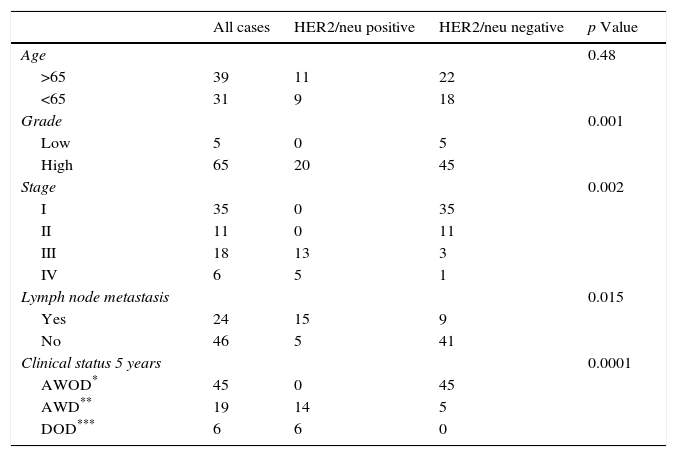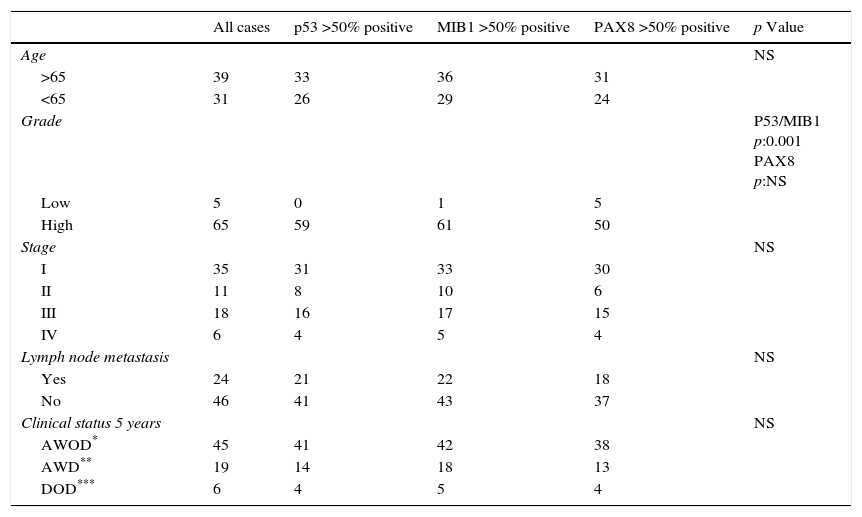Carcinoma of the fallopian tube is a rare gynecological malignancy. A previous review of Primary Fallopian Tube Carcinoma (PFTC) from a multi-institutional study identified several poor prognosis indicators, including the depth of invasion, advanced stage disease, tumor grade and the presence of lymph node metastases. The detection of the malignant lesion at an early stage and the identification of biomarkers with prognostic significance are the major concerns of recent studies.
AimsIn this study, we have investigated the immunohistochemical expression of 4 proteins in cases of low-grade (n:5) and high-grade (n:65) serous PFTC to determine their role in PFTC prognosis.
Material and methodsHER2/neu, p53, PAX8 and MIB-1 were evaluated using immunohistochemistry on a tissue microarray of 70 serous PFTC and the expression was correlated to the following clinico-pathologic variants: age, grade, lymph node metastases, stage and survival.
ResultsHER2/neu oncoprotein overexpression was demonstrated in 20 of 65 (31%) high-grade serous fallopian tube carcinomas. p53 was demonstrated in more than 50% (3+) of the tumor in 59 (90.7%) high-grade serous FTCs, while eight cases (12%) were moderate or weakly positive (2+). The expression of PAX8 was positive in 55 (78.5%) cases, the remaining 15 (21%) cases being negative. The outcome of the disease for patients with tumors showing HER2/neu overexpression was worse (p:0.0001). p53, MIB-1 or PAX8 failed to have a predictive value in disease outcome.
ConclusionThe potential prognostic relevance of HER2/neu in tubal cancer and its potential role in the selection of patients for targeted therapy should be investigated further.
El carcinoma de la trompa uterina (TU) es una neoplasia poco frecuente del tracto ginecológico. Una revisión previa de los carcinomas primarios de la TU, en un estudio multiinstitucional, identificó varios factores de mal pronóstico, incluyendo profundidad de invasión, estadio avanzado, grado histológico y presencia de ganglios linfáticos metastásicos. Detectar esta neoplasia en estadios tempranos e identificar biomarcadores con significado pronóstico ha sido el objetivo de los últimos estudios.
ObjetivosEn este estudio investigamos la expresión de 4 proteínas a través de inmunohistoquímica en 70 casos de carcinomas serosos de la TU (CSTU) (5 de bajo grado [BG], y 65 de alto grado [AG]) para determinar su papel pronóstico.
Material y métodosSe evaluó el estado de HER2/neu, p53, PAX8 y MIB-1 en matrices de tejidos, y se correlacionó con las siguientes variantes clinicopatológicas: edad, grado, metástasis ganglionares, estadio y supervivencia.
ResultadosDemostramos la sobreexpresión de la oncoproteína HER2/neu en 20 de 65 (31%) CSTU AG. p53 se expresó en más de 50% (3+) del tumor en 59 (90,7%) casos, mientras que en 8 casos (12%), la expresión fue moderada o débil (2+). El PAX8 se expresó en 55 (78,5%) casos, y los otros 15 casos (21%) fueron negativos. El pronóstico de las pacientes cuyos tumores sobreexpresaron el HER2/neu fue más adverso (p=0,0001). p53, MIB-1 o PAX-8 no tuvieron un papel predictivo en el pronóstico de la enfermedad.
ConclusionesLa relevancia del papel pronóstico de la sobreexpresión del HER2/neu en el CSTU, así como la posibilidad de seleccionar pacientes para recibir terapias dirigidas deben ser investigadas en más estudios.












